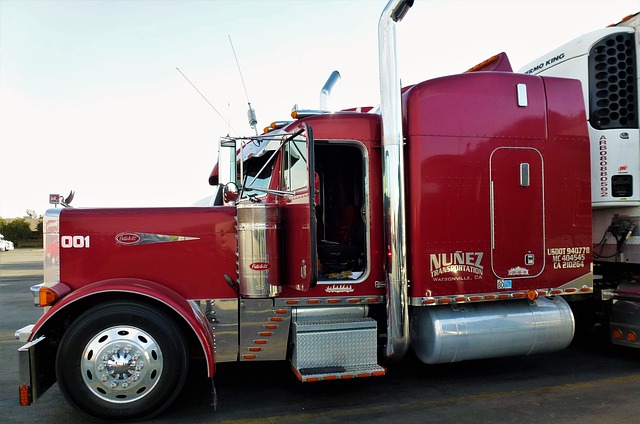Looking to register your car in California? This comprehensive guide breaks down the process step-by-step, ensuring a smooth transition. From understanding eligibility requirements and gathering essential documents for a DMV VIN verifier to mastering the registration process and managing fees, we’ve got you covered. Discover post-registration steps and important considerations to make the experience hassle-free.
- Eligibility Requirements for Car Registration in California
- Gather Necessary Documents for DMV VIN Verifier
- The Process of Registering Your Vehicle at the DMV
- Understanding Fees and Payment Methods
- Post-Registration Steps and Important Considerations
Eligibility Requirements for Car Registration in California

To register a car in California, your vehicle must meet certain eligibility requirements. Firstly, it should be legally imported and compliant with state safety and emissions standards. The California Department of Motor Vehicles (DMV) also mandates that all vehicles undergo a Vehicle Identification Number (VIN) verification process using a trusted VIN verifier like the DMV’s official online tool or a mobile VIN verifier app. This step ensures the vehicle’s authenticity and prevents fraud.
Additionally, you’ll need to present essential documents such as proof of ownership, current registration from another state, valid insurance, and completed forms. A mobile VIN inspection can facilitate this process by providing immediate access to your car’s history, including any previous accidents or outstanding issues, ensuring a smoother registration experience.
Gather Necessary Documents for DMV VIN Verifier

Before heading to the DMV, ensure you have all the required documents for a smooth registration process. The key here is the dmv vin verifier—a critical component that verifies your vehicle’s identity and history. This includes the Vehicle Identification Number (VIN), which can be located on the vehicle’s certificate of title or in its manual.
Gathering a valid vin inspection document, whether from a previous state or a recent purchase, is essential. Additionally, proof of insurance and identification documents such as your driver’s license are mandatory. For added convenience, consider using mobile vin verification services that can streamline the process, making it easier to get your car registered in California.
The Process of Registering Your Vehicle at the DMV

Registering a car in California involves a straightforward process that begins at the Department of Motor Vehicles (DMV). First, gather all necessary documents, including your vehicle’s registration from the previous state, proof of insurance, and identification. Once prepared, visit a local DMV office or use their online services to initiate the registration. During this step, you’ll need to provide detailed information about your vehicle, such as its make, model, year, and unique Vehicle Identification Number (VIN). The DMV will also conduct a VIN inspection to verify the vehicle’s history and ensure it meets safety standards.
After verifying all details, including a mobile VIN verification if needed, you can proceed with the registration fee payment. Upon completion, the DMV will issue your California vehicle registration, updating official records and allowing you to legally operate your car within the state. Always ensure accurate documentation and timely renewals to maintain compliance with local regulations.
Understanding Fees and Payment Methods

When registering your car in California, understanding fees is crucial. The California Department of Motor Vehicles (DMV) charges various fees for vehicle registration, including a base fee and additional costs based on factors like vehicle age and type. It’s important to check the current fee schedule on the official DMV website, as rates can change. You can also expect to pay for a vehicle inspection, which ensures your car meets safety standards. The DMV offers several payment methods, typically including cash, credit cards, and checks. Online payments are also available through the DMV’s website, providing a convenient option for many California residents.
Consider using a mobile vin inspection or mobile vin verification service to streamline the process further. These services utilize a vehicle identification number (VIN) verifier to ensure your car’s history is accurate and free of any red flags before registration. With a simple VIN scan, you can access detailed vehicle information, including accident reports, odometer readings, and maintenance records. This additional layer of verification ensures a smoother registration experience and peace of mind when purchasing a used vehicle.
Post-Registration Steps and Important Considerations

After successfully registering your vehicle with the California DMV (Department of Motor Vehicles), there are several crucial post-registration steps to complete. One essential task is obtaining a Vehicle Identification Number (VIN) verification, which can be done through a trusted DMV vin verifier or a mobile vin inspection. This process ensures that the VIN on your car matches the one reported to the DMV and helps prevent fraud.
Additionally, ensure you keep accurate records of all registration documents and maintain proper vehicle maintenance. Regular vin inspections are recommended to safeguard against potential issues and ensure compliance with California’s vehicle regulations. Consider using a mobile vin verification service for added convenience, allowing you to quickly and easily verify your car’s information from anywhere.
Registering a car in California is a straightforward process, but understanding the eligibility criteria, gathering the right documents, and navigating the steps at the DMV (DMV VIN verifier) is essential. By following these guidelines and ensuring all requirements are met, you can efficiently complete the registration, making your vehicle legal to drive on California roads.
